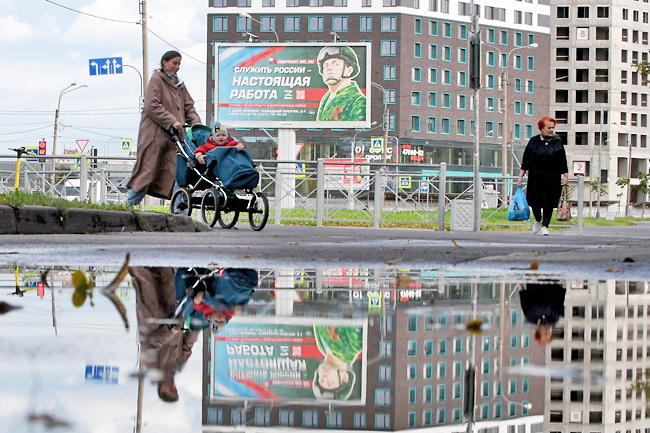KYIV, UKRAINE (AP) – Russian President Vladimir Putin ordered a partial mobilisation of reservists in Russia, in a measure that appeared to be an admission that Moscow’s war against Ukraine isn’t going according to plan after nearly seven months of fighting.
It’s the first mobilisation in Russia since World War II and comes amid recent battlefield losses for the Kremlin’s forces.
The Russian leader, in a seven-minute televised address to the nation aired yesterday morning, also warned the West that he isn’t bluffing over using all the means at his disposal to protect Russia’s territory, in what appeared to be a veiled reference to Russia’s nuclear capability. Putin has previously warned the West not to back Russia against the wall and has rebuked NATO countries for supplying weapons to help Ukraine.
The total number of reservists to be called up could be as high as 300,000, officials said.
Even a partial mobilisation is likely to increase dismay, and perhaps sow doubt, among Russians about the war in Ukraine. Shortly after Putin’s address, Russian media reported a sharp spike in demand for plane tickets abroad, even though far fewer of those have been available since the start of the war and they are much more expensive than before.
Only those with relevant combat and service experience will be mobilized, Russian Defense Minister Sergei Shoigu said. He added that there are around 25 million people who fit this criteria, but only around one per cent of them will be mobilised.
Another clause in the decree prevents most professional soldiers from terminating their contracts and leaving service until the partial mobilisation is no longer in place.

Putin’s announcement came against the backdrop of the United Nations (UN) General Assembly in New York, where Moscow’s invasion of Ukraine on February 24 has been the target of broad international criticism that has kept up intense diplomatic pressure on Moscow.
Ukrainian President Volodymyr Zelenskky addressed the gathering in a prerecorded address yesterday. Putin didn’t travel to New York.
Putin’s gambit has a strong element of risk – it could backfire, by making the Ukraine war unpopular at home and hurting his own standing, and it exposes Russia’s underlying military shortcomings.
The mobilisation is unlikely to bring any consequences on the battlefield for months because of a lack of training facilities and equipment.
United States (US) ambassador to Ukraine Bridget Brink tweeted that the mobilisation is a sign “of weakness, of Russian failure”.
British Defence Secretary Ben Wallace echoed that assessment, describing Putin’s move as “an admission that his invasion is failing”.
“He and his defence minister have sent tens of thousands of their own citizens to their deaths, ill-equipped and badly led,” Wallace said in a statement.
“No amount of threats and propaganda can hide the fact that Ukraine is winning this war, the international community are united and Russia is becoming a global pariah.”
Russian political analyst Dmitry Oreshkin said Putin’s announcement smacked of “an act of desperation”. He predicted that Russians will resist the mobilisation through “passive sabotage”.
“People will evade this mobilisation in every possible way, bribe their way out of this mobilisation, leave the country,” Oreshkin told The Associated Press in an interview yesterday.
The announcement won’t go down well with the general public, Oreshkin said, describing it as “a huge personal blow to Russian citizens, who until recently (took part in the hostilities) with pleasure, sitting on their couches, (watching) TV. And now the war has come into their home.”
The partial mobilisation order came a day after Russian-controlled regions in eastern and southern Ukraine announced plans to hold votes on becoming integral parts of Russia – a move that could set the stage for Moscow to escalate the war following Ukrainian successes.
The referendums, which have been expected to take place since the first months of the war, will start tomorrow in the Luhansk, Kherson and partly Russian-controlled Zaporizhzhia and Donetsk regions.



















































